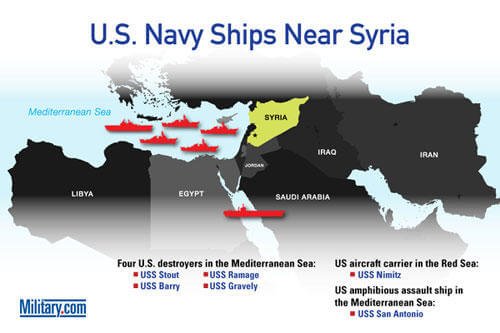The U.S. Navy is poised and ready to respond if called upon by President Obama with four guided missile destroyers, an amphibious transport dock and carrier strike group near Syria, Chief Naval Officer Adm. Jonathan Greenert said Thursday.
"Those forces that are forward deployed are ready. They are organized and ready for a vast spectrum of operations. I'm very confident in that regard," Greenert told an audience Sept. 4 at the American Enterprise Institute, a Washington D.C.-based think tank.
The four guided missile destroyers in the region are the USS Barry, USS Stout, USS Gravely and USS Ramage. Each of the four destroyers currently stationed in the Eastern Mediterranean can carry up to 96 Tomahawk missiles, Navy officials said.
Greenert also addressed the potential costs of any kind of sustained or prolonged military operation. He cited the cost of maintaining a carrier strike group flying extended operations at $40 million a week. He added that Tomahawk missiles cost about $1.5 million each and that maintaining a destroyer can cost up to $2 million a week.
The USS Nimitz carrier strike group, now operating in the Red Sea, was to be headed home following a routine deployment but was extended, he said. The Nimitz is joined by the guided missile cruiser USS Princeton, and three guided missile destroyers – the USS William P. Lawrence, USS Stockdale and USS Shoup.
"This helps us understand the additional burden on the budget," he said.

|
Greenert said an extended engagement may force the Pentagon to seek a supplemental funding bill from Congress, Navy officials said.
"A supplemental might be the order of the day," Greenert said.
While Greenert clearly pointed out that no official decision regarding the use of force had been made, he did say naval forces would be ready in the event that military action against Syria leads to some kind of retaliation.
"We've got all our sensors out in terms of what a potential reaction might be. We're postured to react accordingly," he said.
Greenert also highlighted the Block IV Tomahawk missile, or tactical Tomahawk, which is able to change course in flight an loiter over potential target area.
"It can receive changes in targeting and changes in direction. It can go up an actually loiter. Some call it an unmanned aerial vehicle. It is just that when it is done. It destructs and brings an effect. It is quite a good capability and it brings a really good option to our commanders."





























